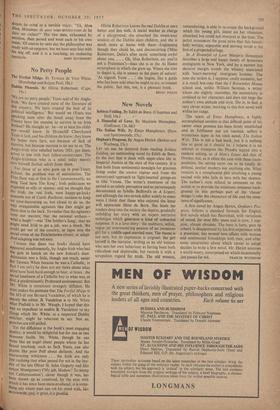New Novels
Schloss Felding. By Edith de Born. (Chapman and Hall, 14s.) •
A Houseful of Love. By Marjorie Housepian. (Gollancz, 13s. 6d.) LET no one be deterred from reading Schloss Felding, an outstanding novel by Edith de Born, by the fact that it deals with upper-class life in Imperial Austria at the start of this century. It is free both from sentimental nostalgia for gracious living under the ancien regime and from the stereotyped approach to light-hearted' goings-on in Old Vienna. The writer's treatment of the period is as subtly perceptive and as picturesquely documented as Sybille Bedford's in A Legacy, and although the two novels differ widely in many ways I think that those who enjoyed the latter will appreciate Mme de Born. She leads her readers deep into the society she depicts, gradually unfolding her story with an expert narrative technique which generates a kind of unhurried suspense. It is a love story : the stubborn, selfish, vague yet overmastering passion of an immature girl for a middle-aged married man. The theme is not new, but its expression is original; the girl herself is the narrator, writing as an old woman who sees her own behaviour as having been both ridiculous and deplorable, but records it with a scrupulous regard for truth. The old woman,
remembering, is able to re-create the background which the young girl, intent on her obsession, absorbed but could not interpret at the time. The jacket announces the good news that this beauti- fully written, enjoyable and moving novel is the first of a projected trilogy.
In A Houseful of Love Marjorie Housepian describes a large and happy family of Armenian immigrants in New York, and by a narrow but decisive margin avoids the whimsy associated with 'heart-warming' immigrant humour. The note she strikes is, 1 suppose, cosily eccentric, but it is much less cosy than the I Remember Mama school and, unlike William Saroyan, a writer whom she slightly resembles, the eccentricity is confined to her characters and does not tinge the author's own attitude and style. She is, in fact, a very clever writer, working in this first novel well within her range.
The talent of Emyr Humphreys, a highly accomplished novelist at that difficult point of his career when promise has been firmly established and its fulfilment not yet reached, suffers a mysterious lapse in his sixth novel, The Italian Wife. This is not a bad book, but it is nothing like as good as it should be. I believe it is art attempt to transpose the Phiedra legend into a modern setting, as A Man's Estate did that of Orestes; but, as is often the case with these trans- positions, the setting turns out to be fatally ill- defined, neither modern nor anything else. What remains is a complicated plot involving a young second wife who falls in love with her stepson. The author's stoic refusal to comment on the action or to provide the minimum sensuous back- ground (is this perhaps part of the 'classic' design'?) robs the characters of life and the situa- tions of significance.
A first novel by Angus Heriot, Orphan's Pro- gress, follows a standard formula for English first novels which has flourished, with variations of mood, for over fifty years and is now, I sup- pose, almost obsolete. The hero is born, goes to school, is disappointed by his first experience with a prostitute, has several love affairs with women and sentimental friendships with men, and after some uncertainty about which career to adopt decides to write a first novel. Mr. Heriot assumes a world-weary, unsurprised air which occasionally


































 Previous page
Previous page